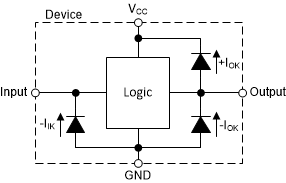SCLS953A August 2023 – January 2024 SN74AHCT1G14-Q1
PRODUCTION DATA
- 1
- 1 Features
- 2 Applications
- 3 Description
- 4 Pin Configuration and Functions
- 5 Specifications
- 6 Parameter Measurement Information
- 7 Detailed Description
- 8 Application and Implementation
- 9 Device and Documentation Support
- 10Revision History
- 11Mechanical, Packaging, and Orderable Information
Package Options
Mechanical Data (Package|Pins)
Thermal pad, mechanical data (Package|Pins)
Orderable Information
7.3.4 Clamp Diode Structure
The outputs to this device have both positive and negative clamping diodes, and the inputs to this device have negative clamping diodes only as shown in Figure 7-1.
CAUTION: Voltages beyond the values
specified in the Absolute Maximum Ratings table can cause damage to the device. The
input and output voltage ratings may be exceeded if the input and output clamp-current
ratings are observed.
 Figure 7-1 Electrical Placement of Clamping
Diodes for Each Input and Output
Figure 7-1 Electrical Placement of Clamping
Diodes for Each Input and Output